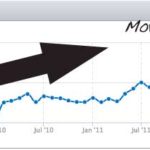We made some fairly significant changes in 2012 to accommodate Google. These sort of changes are not really uncommon in our field and interestingly for most of us, none of them were a real surprise but what has occurred this past year, does represent a shift in thinking for many in our industry. A big part of it has been a lack of understanding on many SEO’s part. Using unsustainable practices is just that, unsustainable. They have been able to get away with it for a while now, some figuring the risks were worth it, others just blissfully ignorant that they would be penalized. Many did indeed get penalized and we heard a lot of grumbling about it. Sometimes Google gets it wrong and penalizes the good guys. Sometimes they will make an adjustment that targets an activity that was once acceptable (like sitewide linking) but fortunately none of our websites saw any significant hits and validated our strategy which has been less about the tricks and more about simply trying to make things right or what we like to refer to as a “healthy web ecosystem”. This one sets you up for strong long-term Internet Marketing performance.
It seems there have been a lot more “what you need to stop doing for SEO” posts this year, many of them addressing key issues that are known tricks of the trade, a definite sign that something is up. The biggest challenge we’ve always found is in justifying the way we do things against those who suggest that they know what they are doing. Clients send us articles from “experts”, blog posts, we were forwarded an email from Network Solutions wondering why we didn’t put meta keywords on a client website, others just wanting us to go ahead and “do our SEO thing” which isn’t something we “do”. Historically, these have all served as good opportunities for us to educate our clients but it’s still a tricky concept to grasp. Some also don’t seem to want to hear it. For those interested though, here are a few of our top features for Internet Marketers in 2013.
Technical – this is biggie for us. We’re stacked towards the technical because it can be the cause of a lot of issues for your healthy web ecosystem. Unknowing developers can create pretty significant issues for clients; duplicate content, linking issues, poor navigation, usability, URL structure, and of course some big ones like blocking search via robots.txt and keep previous websites on servers. On the other hand, a well crafted web presence can be a huge benefit.
Content – right up there. Writing for the web has always required a unique skill as well as writing for Search Engines. The most skillful ones accommodate those 2 but place priority on the user. Overusing keywords is probably the biggest issue here and will earn Google’s ire if abused. The goal here is to create worthwhile content, not content around a keyword or how many times a keyword phrase is used or the percentage of anchor text time relevance + y then carry the 1. Probably the biggest adjustment many had to make this year was the shift away from creating content just to create content. Thin web pages have started to prove more and more useless.
Link Building – this has always been something that felt a little unnatural to us. Comment spamming, social bookmarking, link wheels, forums…are all pretty cheap tactics to build incoming links and as a result we’ve never really done it in excess. We will still do directories (where appropriate), we will also offer up comments where necessary and making sure to join in the conversation but overall these tactics are done. Figuring out new ways to earn links, are not done.
Social – I’ve separated it from content but they really are closely aligned. People really struggle with this a lot and I certainly understand; time constraints, lack of direct value but it’s worth noting that it should not be ignored. I’m not suggesting that it will be the difference between success and failure this year but there is most definitely value in social contribution and I would not discount G+. Also don’t forget about active listening about your company and your community because it’s an essential activity.
Data – last on my list but one of my top requirements for someone in our industry and for sure a tool that really helps to validate what we do, analytics and statistics should not be ignored. I still hear about SEO companies providing ranking reports without ever mentioning analytics and whether or not those keywords were actually working. Learn to read and work with data that counts. Bottom-line goodness.
It’s important to note that keyword rankings are an even more flawed metric than previous years. We understand that clients love them and we do still provide them but with significant caveats. For us they offer an overall “health check” and that’s pretty much it.
 We really hope that the idea of an SEO “tricking” the Search Engines to push them to the top is finally over. For us, SEO may still be a valid concept but we’ve moved away from it. Often spending more time on other elements like usability, CRO, email marketing, PPC, web development, mobile, design etc makes more sense…the SEO that we once knew, is gone and the holistic Internet Marketer (digital marketer, web marketer) is where we are heading. One thing is for sure, it’s going to be an interesting 2013.
We really hope that the idea of an SEO “tricking” the Search Engines to push them to the top is finally over. For us, SEO may still be a valid concept but we’ve moved away from it. Often spending more time on other elements like usability, CRO, email marketing, PPC, web development, mobile, design etc makes more sense…the SEO that we once knew, is gone and the holistic Internet Marketer (digital marketer, web marketer) is where we are heading. One thing is for sure, it’s going to be an interesting 2013.






One Reply to “Our SEO Paradigm Shift for 2013”
Too bad about losing the “cool factor” that SEO sometimes conjures! The take-away seems to be that the finite, single activity of search engine ‘optimization’ is no longer a valid or worthwhile activity. As search engines align more closely behind user preferences, we’re less and less positioning ourselves for the benefit of the search engine, but for the end user. Getting found is still a big deal, but that’s clearly something you can compel by earning it through a healthy, active, relevant, and valuable ecosystem.
Good luck in 2013!